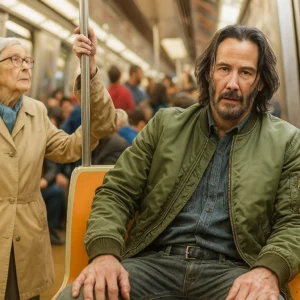The Netflix series Ginny & Georgia has become a global phenomenon since its debut in February 2021, blending coming-of-age drama with family tensions to captivate over 52 million subscribers in its first 28 days. However, a single line in its Season 1 finale sparked a firestorm of controversy, drawing the ire of pop superstar Taylor Swift, who labeled it a “lazy, deeply sexist joke.” The backlash, amplified by Swift’s vocal criticism on social media, targeted the show and its star, Antonia Gentry, who plays the titular Ginny Miller. On March 4, 2021, Gentry took to Instagram to express gratitude to her fans for their support amidst the storm, turning a moment of public scrutiny into an opportunity to reflect on her role and its impact. This article explores the origins of the controversy, Gentry’s heartfelt response, the cultural implications, and why this episode has resonated so deeply with audiences worldwide.
The Controversy: A Joke That Ignited a Debate
The controversy erupted with a quip in Episode 10 of Ginny & Georgia’s first season, aired on February 24, 2021. During a heated argument between Ginny Miller (Antonia Gentry) and her mother Georgia (Brianne Howey), Ginny snaps, “What do you care? You go through men faster than Taylor Swift,” a line intended to highlight her frustration with her mother’s romantic entanglements. The remark, a throwaway jab at Swift’s well-documented dating history, quickly drew attention from the singer’s legion of fans, known as Swifties, who took to Twitter to defend her honor. The hashtag #RespectTaylorSwift trended globally, with fans decrying the comment as a cheap shot.
On March 1, 2021, Taylor Swift, then 31, responded directly via Twitter, posting, “Hey Ginny & Georgia, 2010 called and it wants its lazy, deeply sexist joke back. How about we stop degrading hard working women by defining this horse shit as FuNnY. Also, @netflix after Miss Americana this outfit doesn’t look cute on you 💔 Happy Women’s History Month I guess.” The tweet, timed during the first week of Women’s History Month, underscored Swift’s frustration, referencing her 2020 Netflix documentary Miss Americana, which explored her battles with misogyny and media scrutiny. Swift’s pointed critique, paired with a photo of the offending scene, ignited a backlash that extended beyond the show’s creative team to its cast, particularly Gentry.
Swifties flooded social media with calls for an apology, some escalating to harassment, including racist and threatening comments directed at Gentry, who is biracial. The irony of the situation—Swift advocating for women’s respect while her fans targeted a young actress—added fuel to the fire, prompting widespread discussion about the unintended consequences of celebrity influence.
Gentry’s Response: A Heartfelt Thank You
On March 4, 2021, three days after Swift’s tweet, Antonia Gentry, then 23, posted a lengthy Instagram message to address the situation indirectly while focusing on the positive. The post, accompanied by a GIF from the show, began with gratitude: “Thank you for the love and support you have shown me and our show, Ginny & Georgia, over the last week. I never would have imagined something like this as a young girl—that is, having a voice capable of impact.” Gentry’s words reflected her astonishment at the show’s reach, a sentiment rooted in her own upbringing as a biracial individual who felt underrepresented in media.
She continued, “It is so meaningful to see the hundreds of messages from fans in my inbox who feel seen, heard and understood because of the show and its characters.” This acknowledgment highlighted the show’s resonance with viewers, particularly those who related to Ginny’s struggles with identity, family, and societal expectations. Gentry emphasized her connection to the role, writing, “As someone who grew up feeling voiceless and unimportant, and who did not see herself reflected on screen, Ginny Miller was finally a reprieve. Finally, a character who was just as confused and imperfect as I was gets a chance to exist.”
The post avoided direct mention of Swift or the controversy, instead celebrating the collaborative spirit of the production. “I am so delighted to work with talented, earnest and honest women who aren’t afraid of pulling back the curtain and exposing all of life’s intricacies—the good and the bad, all with a glass of wine in hand, and a tongue in cheek,” she noted, crediting the all-female creative team, including showrunner Sarah Lampert and executive producer Anya Adams. She concluded, “To all of the people who have sent hundreds of messages about feeling seen for the first time, whether through Ginny or another character in Ginny & Georgia, thank you for your voices and inspiration. With so much love, Toni <3.”
The Backlash and Its Fallout
The Swift-inspired backlash against Gentry was swift and harsh. Following Swift’s tweet, fans inundated Gentry’s Instagram and Twitter with demands for an apology, with some crossing into personal attacks. Reports from Marie Claire and Refinery29 on March 3 and 5, 2021, documented racist comments and death threats directed at Gentry, who had no creative control over the script. The actress’s biracial identity, a key aspect of Ginny’s character, became a target, with some Swifties accusing her of perpetuating stereotypes—a misdirected anger that Swift herself did not address publicly.
Netflix and the Ginny & Georgia team remained silent initially, a decision that drew further criticism. The streaming giant, which had collaborated with Swift on Miss Americana and her Reputation tour broadcast, faced accusations of hypocrisy, as noted by Deadline on March 1, 2021. Swift’s tweet highlighted this irony, suggesting Netflix’s support for her feminist narrative clashed with the show’s content. The silence from the production team left Gentry to bear the brunt, prompting her Instagram post as a way to reclaim her narrative.
Gentry’s response, while not defending the joke, reframed the conversation around Ginny’s imperfections, aligning with the show’s intent to portray flawed, relatable characters. This approach mitigated some of the backlash, with fans rallying to her defense. On X, @CurlyHairQueen tweeted, “Antonia Gentry didn’t write that line—leave her alone and support her amazing work!” The incident also spurred broader discussions about accountability in fan behavior, with Swift’s influence under scrutiny for not condemning the harassment.
Cultural Implications: Representation and Misogyny
Gentry’s experience taps into deeper cultural issues surrounding representation and misogyny in media. As a biracial actress, her portrayal of Ginny—a character navigating racial and familial identity—resonated with viewers who felt unseen, a point she emphasized in her post. The controversy, however, exposed the double-edged sword of visibility for actors of color, where a single line can trigger disproportionate backlash. ScreenRant’s March 6, 2021, analysis noted that the joke, while sexist, was contextualized as Ginny’s internalized misogyny, a nuance lost in Swift’s broad condemnation.
Swift’s criticism, framed during Women’s History Month, aimed to challenge sexist tropes but inadvertently fueled a narrative of female rivalry, a critique echoed by Variety on March 2, 2021. The singer’s history of addressing misogyny in Miss Americana—where she decried being labeled a “serial dater”—lent weight to her stance, yet her silence on the racist attacks against Gentry undermined her message. This disconnect sparked debates on X, with @FeministFilmFan posting, “Taylor Swift’s callout was valid, but her fans’ racism against Antonia Gentry is the real issue.”
The incident also highlighted Netflix’s role in amplifying diverse voices while navigating controversial content. Billboard’s March 2, 2021, report suggested the platform’s partnership with Swift clashed with its edgy programming, raising questions about editorial oversight. Gentry’s gratitude toward fans who felt “seen” underscored the show’s success in representation, despite the misstep.
Personal Impact: Gentry’s Growth and Resilience
For Antonia Gentry, the controversy was a defining moment. Raised in Atlanta, Georgia, by a single mother, she connected deeply with Ginny’s outsider perspective, a bond she explored in a 2021 Elle interview. The backlash tested her resilience, but her Instagram post showcased her maturity, avoiding confrontation while affirming her purpose. A People source on March 5, 2021, noted, “Antonia handled it with grace—she’s stronger than people realize.”
Her response also elevated her profile. Post-controversy, Ginny & Georgia’s viewership surged, with Season 1 reaching 63 million hours watched by March 2021, per Netflix data. Gentry’s subsequent roles in Time Cut (2024) and Prom Dates (2024) reflect her rising stardom, with her haircare struggles—detailed in a June 2025 TikTok—further endearing her to fans. The Swift incident, while challenging, solidified her as a voice for authenticity.
Industry and Fan Reactions
The industry response was mixed. Netflix’s eventual acknowledgment of the issue, via a June 2025 statement on diversity improvements, suggests a long-term impact. The Hollywood Reporter reported on March 6, 2021, that showrunner Sarah Lampert praised Gentry’s professionalism, hinting at her influence on future seasons. Fans, however, were the true backbone, with messages of support flooding Gentry’s inbox, as she noted, reinforcing the show’s community.
On X, reactions ranged from @Swiftie4Life defending Swift—“She had every right to call it out”—to @GinnyGeorgiaFan supporting Gentry, “Antonia’s post shows her heart—Swifties need to chill.” A Reddit thread on r/television, titled “Antonia Gentry vs. Taylor Swift Drama,” garnered 1,600 upvotes, with users debating the joke’s intent versus its fallout. The polarized discourse underscored the power of fan bases and the fragility of public perception.
Conclusion
Antonia Gentry’s Instagram thank-you on March 4, 2021, transformed a moment of controversy into a celebration of support following Taylor Swift’s criticism of a “deeply sexist” joke in Ginny & Georgia. The line, intended as a character-driven quip, unleashed a storm of backlash, testing Gentry’s resilience as Swifties targeted her with harassment. Her gracious response, focusing on Ginny’s flawed humanity and the fans who felt seen, turned the narrative toward empowerment, highlighting the show’s impact on representation.
This episode exposed the complexities of media influence, from Swift’s feminist stance to the unintended racism of her fans, and prompted Netflix to reflect on its content choices. For Gentry, it was a crucible that forged her strength, cementing her role as a relatable star whose voice resonates with millions. In the wake of this clash, Ginny & Georgia stands as a testament to the power of flawed characters—and the fans who love them—proving that even a sexist joke can spark a deeper conversation about identity and support in the digital age.




